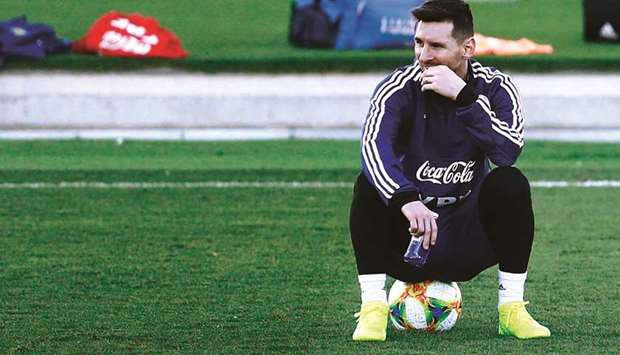Last weekend, Lionel Messi hit a high even in the context of his ridiculous career, his name chanted by opposing fans after another astonishing hat-trick. This week, it’s back to an environment that has never been so happy for him, back to the one area of his career in which there is a sense still of something missing: Argentina.
Debates about who is or was the greatest are futile. There are too many different variables at play. But to someone who had never seen them, who looked only at the numbers, the comparison between Messi and Diego Maradona would seem absurd. One of them has played consistently as a genius for 14 years, the other produced perhaps four seasons of genius across his career. But the mind seems to struggle with consistency, to privilege the peaks and troughs of Maradona’s story over the relentless brilliance of Messi’s. The memory deals in moments and with Messi it’s almost as though there have been too many to process. And, vitally, one of Maradona’s moments involved lifting the World Cup.
When Argentina lost to France in Kazan in the last 16 of the World Cup last summer, Messi quietly backed away from the national side. This wasn’t like 2016 when he retired from international football after missing a penalty in the shoot-out as Argentina lost to Chile in the final of the Copa América Centenario. This time there was an understanding that he would be back at some point. As it turned out, that point was rather later than it had been after what happened in 2016.
Back then he was persuaded back after two months. This time his break has lasted nearer nine. But, crucially for Argentina and their accidental manager, Lionel Scaloni, Messi will play for his country for the 129th time against Venezuela in Madrid today.
Whether he will then travel with the team to Tangier to face Morocco next week is unclear. Messi, remarkably in the modern age, has managed to maintain his silence on the national side since the World Cup. In that context, the comments of the national team director, César Luis Menotti, this week that he was worried Messi was tired were perhaps paving the way for his star to take next week off.
That said, Menotti had also suggested Messi shouldn’t be called up at all, that this was a time for experimentation. Given the Copa América begins in three months, that seems a bold approach. But then, as ever, Argentinian football is in chaos.
Scaloni, who was part of Argentina’s 2006 World Cup squad alongside Messi, has never been a head coach before and got the job largely because he had been an assistant to Jorge Sampaoli who left after a draining World Cup in which he had raged impotently from his technical area. Scaloni initially took over as a caretaker but then it was simply easier and cheaper to keep him on, with the largely symbolic addition of Menotti as director. His contract runs until June.
His start hasn’t gone too badly. Six games have brought four wins and only one goal conceded, although that was in a defeat to Brazil.
But friendlies are friendlies and for all the change Scaloni has begun to effect, there’s little reason to suppose Argentina are in a better position to win a trophy now than at any point in the 26 years in which they have failed to do so (the Olympics notwithstanding).
Some old names have dropped away. Javier Mascherano has retired. Gonzalo Higua?n’s poor form has cost him his place. Nicol?s Otamendi and ?ngel Di Mar?a have both withdrawn with injury. Eleven of this squad have never played with Messi before. Perhaps a sense of freshness was required. The Paris Saint-Germain midfielder Giovani Lo Celso looks likely to start, which, given how well he linked with Messi in the pre-World Cup friendly against Haiti before being discarded, seems sensible.
But there are other issues that are harder to understand. It looks as though Lautaro Mart?nez will start at centre-forward. His Internazionale teammate Mauro Icardi probably would have played had he not been sidelined for six weeks after being stripped of his club’s captaincy by Luciano Spalletti. But why Sergio Agüero is not even in the squad remains a mystery with rumours persisting of a falling-out between him and Scaloni. But that’s been his recent history with the national team: where Higua?n has been given chance after chance, Agüero has regularly been discarded after poor team performances.
As ever, though, the main drama is about Messi. He is 31 now, older than anyone else in the squad apart from the goalkeeper Franco Armani. He is coming towards the end. He may have one more World Cup left in him, but perhaps not even that.
Conmebol’s capacity to invent new tournaments means he should have at least two more Copas América. The players around him now are not as gifted as those he has played with in the past for Argentina.
The hope is that that will make it easier to create a structure in which Messi can thrive. But the clock ticks ever louder, for him and for Argentina

Argentina’s forward Lionel Messi takes a break from a training session at the Real Madrid’s training facilities in Madrid. (AFP)
